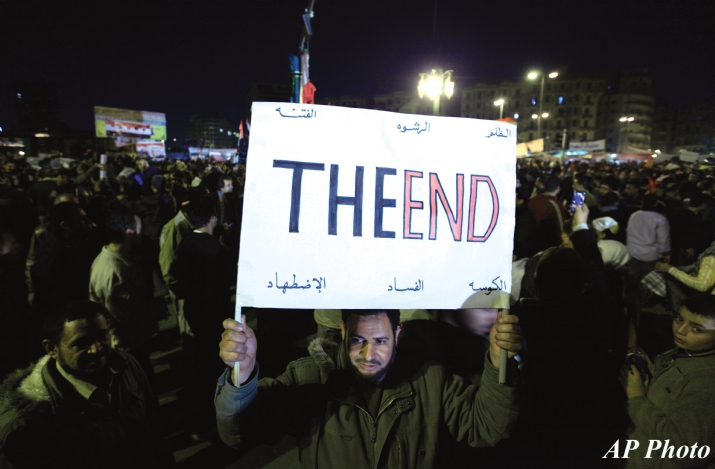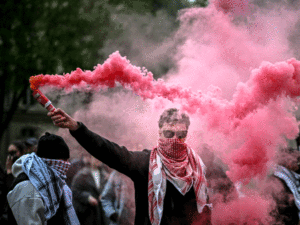On a more immediate level, Mubarak’s downfall reminds us of the inherent instability of dictatorships, especially the softer kind not willing to mow down thousands of opponents, and the danger of any foreign policy predicated on the invincibility of a tyrant. Ultimately, only understandings and treaties entered into by governments that operate with the consent of the governed can claim enduring legitimacy. Mohamed ElBaradei, the former head of the International Atomic Energy Agency, was not completely wrong when he described the Israel-Egyptian peace treaty as that of a single man – Anwar Sadat – and thus not binding on Egypt.
Recent events have confirmed then Secretary of State Condoleezza Rice’s words at the outset of President George W. Bush’s second term: “For 60 years, my country, the United States, pursued stability at the expense of democracy in this region, here in the Middle East, and we achieved neither.” Unfortunately, when the United States pushed Mubarak to open up the political system, he replied, “Mind your own business.” And there matters ended.
Natan Sharansky, in the Case for Democracy, points to another important advantage of democratic neighbors: Democracies are less bellicose and have less need to distract the population by conjuring up external enemies than do dictatorships. Even Mubarak, who faithfully preserved the peace treaty with Israel, nevertheless injected heavy doses of anti-Semitism and anti-Israel propaganda into the Egyptian state media.
YET, NO MATTER how much an Egypt offering its citizens a greater range of freedom of expression and the ability to exercise some control over their lives might be a desideratum, the question that must be asked is: How likely is the recent turmoil in Egypt to lead to democracy and not to something far worse than Mubarak, just as the downfall of the Shah of Iran brought Ayatollah Khomeini and the Islamic Revolution?
There is little doubt that Egypt could hold elections eight months from now. But as Sharansky warned in The Case for Democracy: Never confuse elections with democracy. In order for a stable democracy to emerge, a lot of groundwork must take place in advance. Where the ground has not been laid, elections are likely to be of the “one man, one vote, one time variety,” like those that brought Hamas to power.
One precondition for democratic elections is the existence of a civil society in which individuals join together to define common goals and develop means of attaining them. Freedom of expression and a culture sympathetic to it is another crucial aspect of the move toward full-fledged democracy. Sharansky put this in terms of a public square test: Can a person enter the public square and shout without fear, “Down with the government”?
No Arab countries could fully pass the public square test. Arab countries consistently rank at or near the bottom of Freedom House’s Freedom Index. The one Middle Eastern Muslim country in which some variant of democracy developed was Turkey under Kemal Ataturk and his successors. But that is an example of a modernizing military seizing power and only gradually opening up the political system as the population became more and more attuned to the responsibility for individual decision-making upon which democracy depends. In Turkey, that was a long process, which included a major revamping of the education system and even a change of the alphabet from Arabic to Latin characters, in order to raise literacy rates. And even today, Turkey is rapidly reverting to a state in which political opponents – real, imagined, or merely potential – often find themselves in jail.
Middle Eastern countries are top-down polities, run by a ruling family or clique, rather than ones in which legitimacy derives from the consent of the governed. People seize power to make money, and once they do, the country “belongs” to them. Thus, Saudi Arabia derives its very name from that of the ruling House of Saud. Jordan belongs to the Hashemites, even though they are of Arabian origin.
Many of the factors that favor democratic evolution are absent or weak in Egypt. It has a small middle class, few resources that would enable any government to dramatically increase the standard of living in the near future, and a large and well-organized Islamist group. A full quarter of Egyptians are illiterate, and half live on less than two dollars a day. One-third of those employed work for the government, a sure guarantee of economic rigor mortis, in a country in which 900,000 young people enter the labor market every year. Yet, curing that rigor mortis would involve reducing the public sector dramatically, which would only trigger greater instability.
For every revolution that has brought about democracy, there are more examples of those in which the revolution was captured by a more brutal and ideologically committed group. Robespierre, Lenin and Ayatollah Khomeini all succeeded in overcoming less ruthless adversaries and turning their respective revolutions in less free and democratic directions.
HOW LIKELY IS IT that Egypt’s best organized opposition group, the Muslim Brotherhood, will succeed in doing the same in Egypt, as its offshoot Hamas has done in the Gaza Strip? First, it must be understood that the Muslim Brotherhood’s goal is the imposition of Shariah law, first in Egypt and other Muslim countries and then globally. Its motto makes that clear: “Allah is our objective. The Prophet is our leader. The Koran is our law. Jihad is our way. Dying in the way of Allah is our highest hope.”
Shariah cannot be reconciled with democracy, because it denies the validity of any man-made system of law. Ayatollah Khomeini expressed the fundamental incompatibility best speaking about the Islamic Revolution in Iran: “This is not an ordinary government. It is government based on Shariah of Islam. . . . Revolt against G-d’s government is a revolt against G-d. Revolt against G-d is blasphemy.” He did not need to add that the punishment for blasphemy is death.
It matters not one whit whether the Muslim Brotherhood agrees to participate in elections or not, whether it eschews violence as a tactic for the present or not, as long as its goal is the imposition of Shariah, which once in place cannot be questioned. The Muslim Brotherhood would almost certainly put forward a technocrat candidate like ElBaradei, who was given the sobriquet “Iran’s stooge,” by Malcolm Hoenlein for his consistent rewriting of the data as head of the IAEA to downplay the Iranian nuclear threat. (As soon as he left the IAEA, it began producing under its new Japanese director unambiguous reports on the military aspects of Iran’s nuclear program.) But ElBaradei would be the Muslim Brotherhood’s puppet to an even greater extent than he was Iran’s. He has no independent base of support in Egypt.
As mentioned, the Muslim Brotherhood is the only well-organized opposition to the Mubarak regime – one of the reasons that the failure to push Mubarak harder not to imprison democratic reformers, such as 2005 presidential candidate Ayman Nour, was such a mistake. The Brotherhood’s Salafist call for a return to the pure Islam of “the Prophet” has been a major current of Egyptian intellectual life since its founding in 1928, and it would find much to draw on in existing Egyptian public opinion. The Pew Research Center’s 2009 extensive survey of Egyptian public opinion does not suggest the great yearning for Western-style democracy and freedoms that would immunize the population to the lure of the Muslim Brotherhood.
The Pew Center survey found that 95% of Egyptians would like to see religion play “a larger role in politics.” Eight-four percent support the death penalty for those who abandon Islam; 77% support the cutting off of the hands of thieves; 54% think that suicide bombings against civilians can be justified; and nearly half describe themselves as supportive of Hamas. Over four-fifths expressed anti-American views. For the Muslim Brotherhood, of course, the West, headed by America, is the great temptress, seeking to lure Muslims from the pure path. The Brotherhood hates the West for what it is, not what it does.
Professors Lisa Bayles and Drew Linzer put the minimum level of support for the Muslim Brotherhood at the 20% its candidates garnered in the 2005 elections, when they were severely repressed. And in a 2008 survey of the religiosity of the Egyptian population, they found 60% to harbor fundamentalist religious views – largely measured in terms of the suppression of women – that would make them susceptible to the appeal of the Muslim Brotherhood.
On the other hand, the Muslim Brotherhood had little role in the initial demonstrations against Mubarak and only joined the bandwagon later. The issues that triggered those demonstrations against Mubarak – rising bread prices, the lack of jobs for young people, even those with university education, and their inability to marry as a consequence – are not the province of the Muslim Brotherhood. (On the other hand, they had little to do with democracy either.) Despite the many posters depicting Mubarak with a Jewish star over his visage, Egyptian-Israel relations were not a major issue for the mob.
A poll taken last week of 343 residents of Cairo and Alexandria for the Washington Institute for Near East Policy found only 15% support for the Muslim Brotherhood and much less for ElBaradei as a presidential candidate. Most encouraging was that a plurality of 37% to 22% supported a continuation of the Egyptian-Israel peace treaty. The latter encouraging news was somewhat offset, however, by this week’s call by Ayman Nour, Egypt’s most prominent pro-democracy voice, for a reexamination of the peace treaty.
WHERE DOES ALL THIS LEAVE US? For now, all that has happened in Egypt is that the military has replaced the leader of the previous regime. But it continues to rule under the same emergency measures under which Mubarak governed since assuming power, in the wake of the assassination of Anwar Sadat. So far, the military has shown the will to continue its dominance of the Egyptian state that dates back to 1952.
Nevertheless, the military has committed itself to holding elections scheduled for September. The big questions concerning those elections are: (1) Who will be allowed to participate? (2) If allowed to participate, how would the Muslim Brotherhood fare? The answer to the first question depends to some extent on the answer to the second, though there are many historical examples of revolutions hijacked by the best organized and most ideologically determined group once it gains a foothold. Answering the second question requires top level intelligence. In that regard, it hardly inspires confidence that the U.S. administration had no inkling of any threats to Mubarak’s rule or that its Director of National Intelligence James Clapper publicly described the Muslim Brotherhood as a “largely secular” organization.
The United States might use its influence, including $1.5 billion in annual military aid, to pressure the Egyptian military to allow the Muslim Brotherhood to participate. In general, the administration has shown consistent naïveté about the Muslim Brotherhood and its ability to work with it. The Muslim Brotherhood was well-represented at President Obama’s 2009 Cairo speech, at the express invitation of the American government. Despite the FBI’s discovery of a 15-page Muslim Brotherhood document outlining a long-range plan to bring Shariah to America, senior administration officials continue to meet with and work closely with a number of Muslim “defense” organizations listed as fellow-travelers in that document, some of whom were unindicted co-conspirators in the Holy Land case involving funding of Hamas terrorism.
One thing seems certain: the Middle East is headed for a period of instability that will likely result in a weakening of the current pro-Western bloc – Egypt, Saudi Arabia, Jordan, Kuwait, the Gulf States – vis-Ã -vis the Iranian axis and a diminution of American influence with allies as well as enemies. Every complaint raised by the masses in Tahrir Square against Mubarak could be raised against any of the monarchies listed above. The heads of those monarchies noted well and were appalled by the manner in which the United States eventually cut Mubarak loose, with President Obama rejecting a direct appeal from the Saudi king to let Mubarak exit with his dignity intact. The United States is increasingly seen, as Professor Bernard Lewis once put it, as “harmless to its enemies and unreliable to its friends.”
For now, the Egyptian military remains firmly committed to the peace treaty with Israel, which it recognizes as the one force that could threaten its very existence. But even if the Muslim Brotherhood does not come to power, Israeli policymakers must still worry about the rise of a new generation of officers who know not war with Israel, and may one day feel the temptation to return to ultra-nationalism of the Nasser-led officers’ coup of 1952.








